#terra foam
Text


66 notes
·
View notes
Text

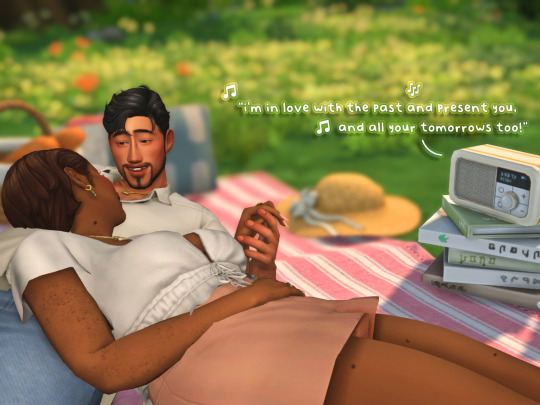
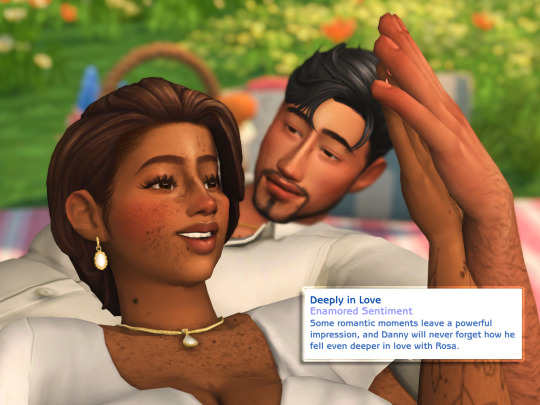


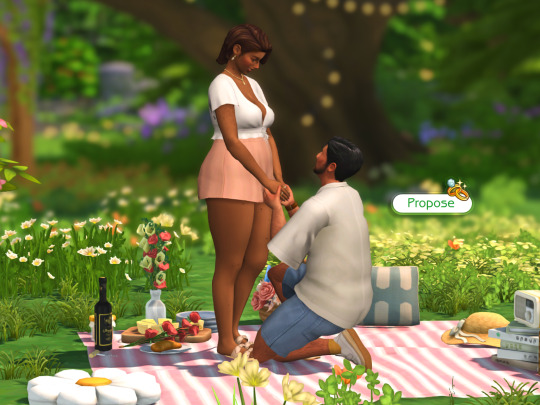
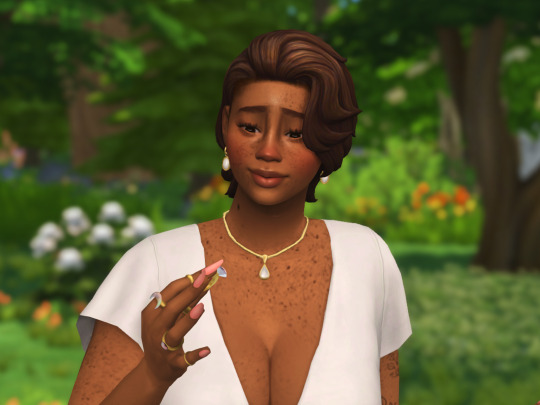




"I will die a better man with you in my life /
I can't wait to tell the world that you're my wife!" (♪)
#ts4 gameplay#sims 4 gameplay#postcard legacy challenge#IM IN LOVE WITH EVERYTHING ABOUT YOU ALL THE OLD AND ALL THE NEW ‼️ YOU KEEP GETTING BETTER AND BETTER 🎤🎤🔊🔊🗣️‼️#PLEASE PLEASE LISTEN TO THE SONG‼️‼️#this is literally their song like im foaming at the mouth you have no idea#my babies are engaged and i was actually fr crying 🦔 dont look at me#danny booo ‼️‼️🍅🍅 cornball cornball. how you gonna prepare a romantic picnic date and propose on love day.....CORNY*#*bullying my sims as a sign of affection 🦔🫰🏽#danny’s sister terra’s watching juliette and she’s probably teaching her how to cuss#he prepared everything they ate that day and absolutely refused to let rosa in the kitchen#he was probably even more nervous preparing the sweets than he was for the actual proposal#with the love of his life being a baker he was a little flustered about the taste but he did just fine 🥺#postcard: gen2#queue#sim: rosa han#sim: danny avagyan
320 notes
·
View notes
Text
In the final stretch of my Battle Damaged Lingering Will armor. Broken Will
#cosplay#video games#square enix#3dprinting#birth by sleep#kh terra#kingdomhearts#foam armor#kingdom hearts
30 notes
·
View notes
Text
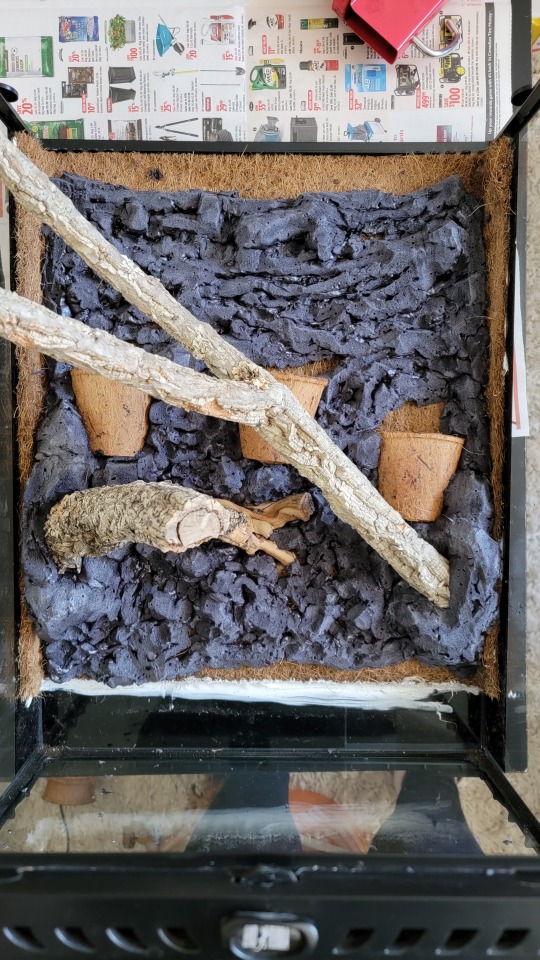

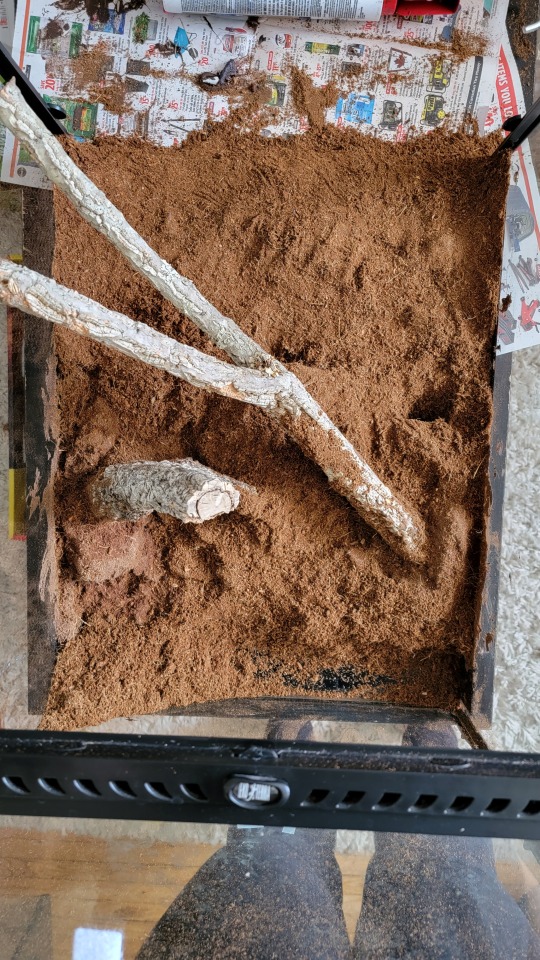

finished kiwi's background! i'll take better pictures in the daylight tomorrow, i still need to brush more of the eco earth off and moisten the moss so it expands, but it's looking soooo good!!
i'm gonna post the steps under this cut, for those who are interested :)
i carved and sanded the spray foam and got rid of any of the shiny/smooth hardened outer part. the silicone adheres better to the foam if it's rough and not smooth
note: i like using black spray foam, normally its yellow. it doesn't really matter, but i find if there's places i've missed with the silicone and the foam happens to show through, it's less noticeable if it's black foam underneath. this is the same reason i use brown silicone and not clear or white. it blends in so much better with the dirt.
2. applying the silicone and eco earth (aka coco fiber) to the foam. i do this with the tank lying down on a table. this step is done in sections, and quickly, so the silicone doesn't set before you put coco fiber on it. so, working in small sections, wearing gloves, i squeeze a bunch of silicone over the foam, use my other hand to smear it around and get it in all the crevices (it's sooo sticky and messy), then i quickly dump a handful of eco earth onto it and press it down. i kept doing this over and over in small sections until the whole backing is covered!
i let this sit and cure for a few hours. then i put the tank back upright, and shake it so the excess eco earth falls off. then i like to use the rest of my silicone and put random dots of it on the background and press dry compressed moss into it.
i also siliconed a few vines around the tank, i actually made those vines a while ago by taking jute rope, covering them in brown silicone, and rolling them in eco earth!
and kiwi's coconut is tied to the screen top using strong fishing line.
so yeah that's what i've been up to all day! i'm going to let the silicone cure overnight, then start planting the tank tomorrow. it'll still be a few days before i can move kiwi back in ❤️
#reptiblr#diy reptile background#for pancakes new tank.. yknow those foam backings the exo terra tanks come with.. i took hers out and covered it in silicone#then put eco earth and moss on it.. and it looks sooo good#both tanks are gonna look so nice once i'm done!
7 notes
·
View notes
Text

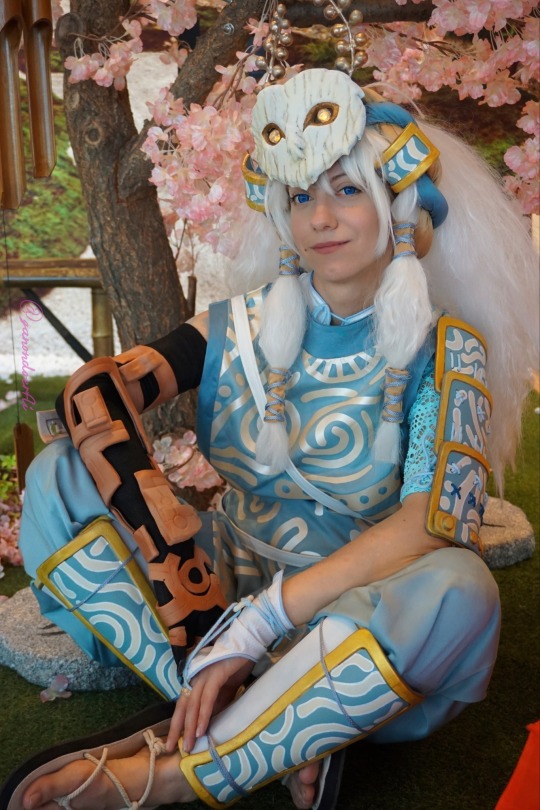
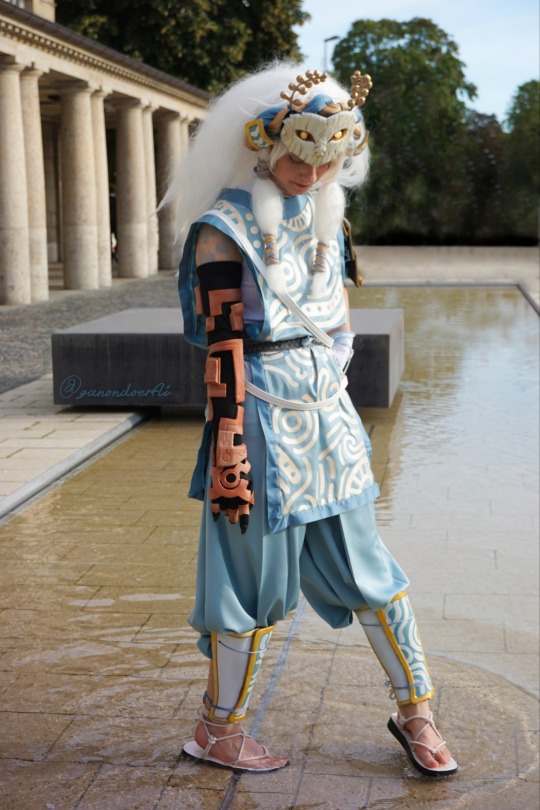
I'm so excited to share my most recent cosplay from Connichi 2023!
Cosplay made and worn by me (@ganondoerfli)
Character: Link from The Legend of Zelda - Tears of the Kingdom
Armor Set: Mystic Set
Photos taken by my BFF: @ithilcelevon
Date of photos: 2023-09-12
Reference picture:

Keep reading for more details on the making of the cosplay props:





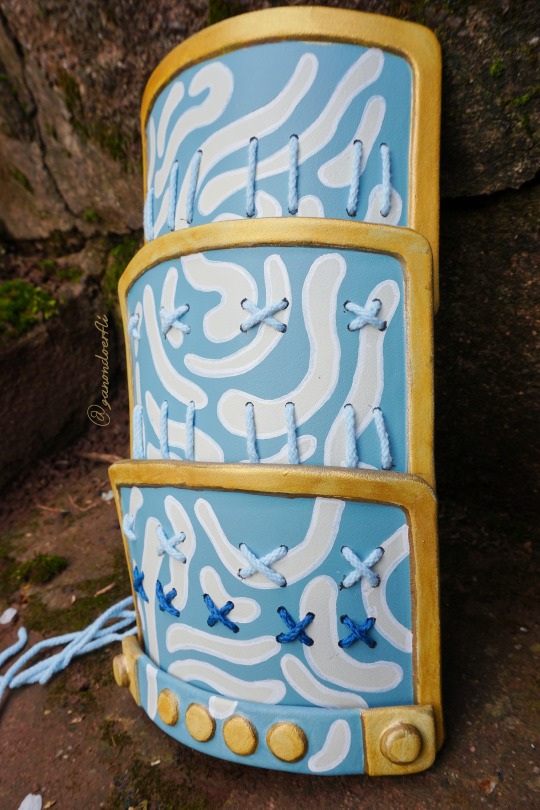
🌸The Satori mask🌸:
I made this mask using worbla on a foam base. The LEDs I used inside the eyes were taken from LED tea candles. They give the light a cool flickering effect.
🌸The right arm🌸:
For Rauru's right arm I wore the runes on top of a scaly glove.
-> First I sewed the glove from a very textured jersey fabric.
-> Then I added some artificial nails on top, which I modified to look like claws.
-> In order to construct the pattern for the runes, I actually had to create a makeshift cast of my arm first. For this, I wrapped my whole arm in newspaper and crepe tape. After cutting the cast open and removing it from my arm, I filled it with more newspaper to make it sturdy enough to work with.
-> This paper cast of my arm was perfect for constructing the pattern, since it could be rotated in any direction (as opposed to my real arm🙃)
-> Using the finished pattern, I made the runes from foam rubber and worbla and shaped them with heat. I painted them using terra-cotta spray paint.
🌸The clothing🌸:
I used satin fabric for a nice and flowing look on the clothes.
In order to recreate the shimmering pattern on the robe, I used heat transfer vinyl.
🌸The armor🌸:
All armor pieces are made from foam and worbla. I've been using this technique for many years, it really works great! The armor pieces were then painted with lacquer and gold acrylic paint.
Making this cosplay was a lot of fun!
Tears of the Kingdom offers so many beautiful designs and outfits.
I can't wait to make more from this game! <3
#the legend of zelda#tears of the kingdom#totk#cosplay#tloz totk#loz#Link#zelda cosplay#zelda#my stuff
450 notes
·
View notes
Text
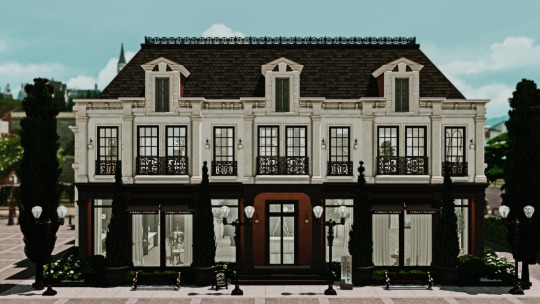
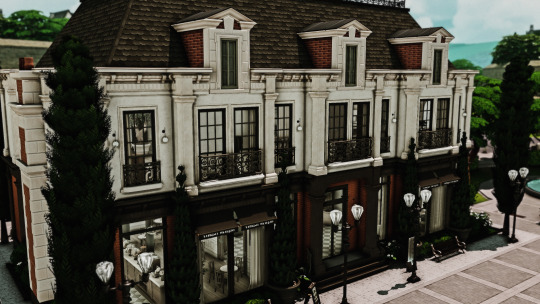
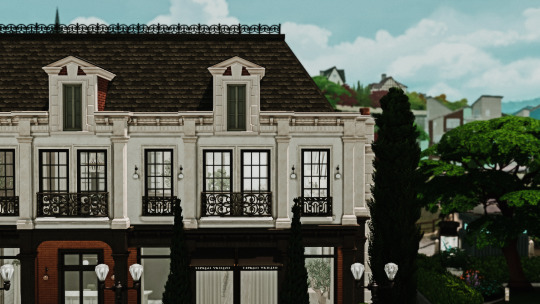
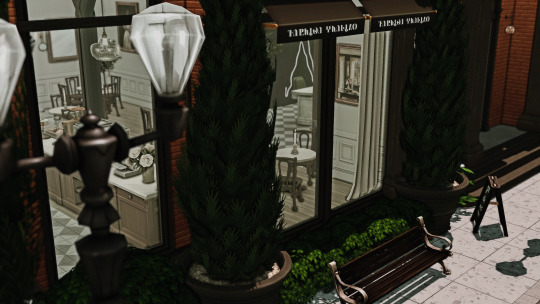
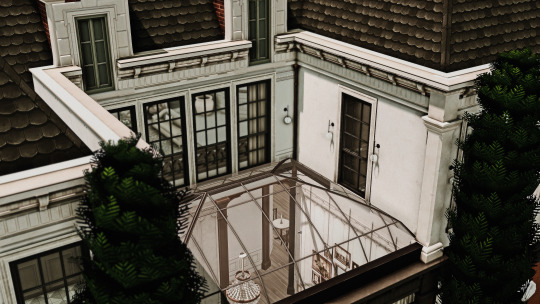
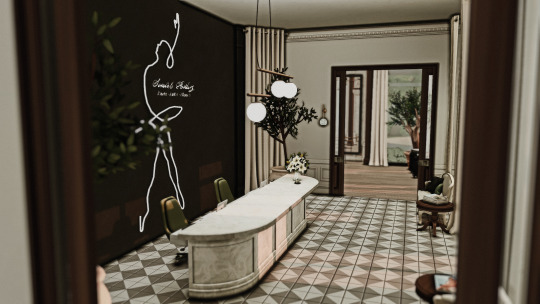
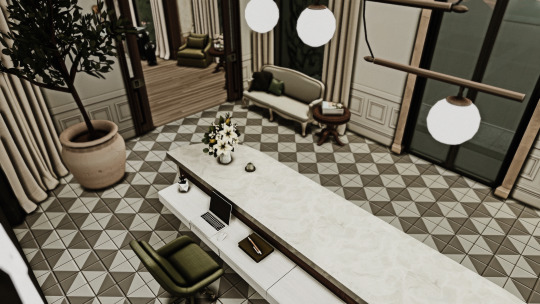
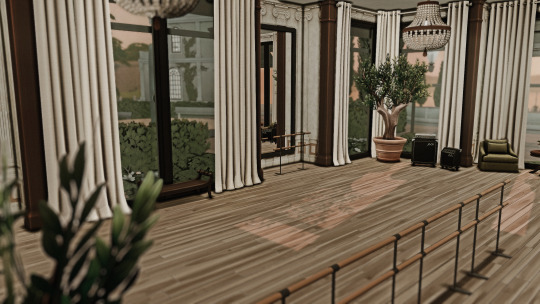
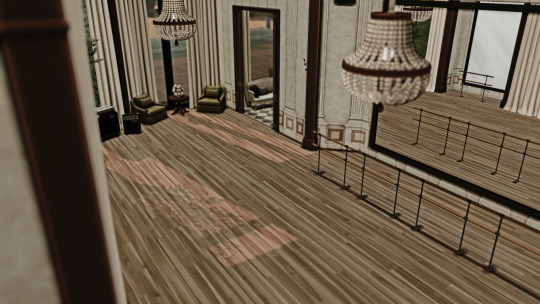
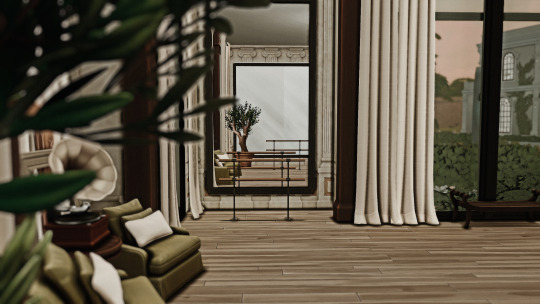
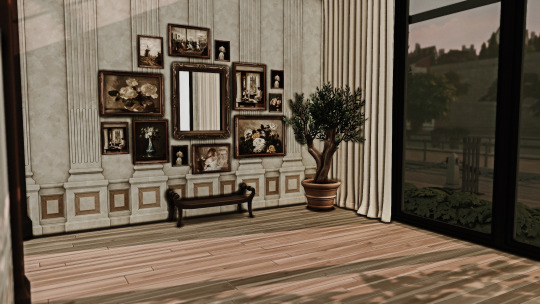
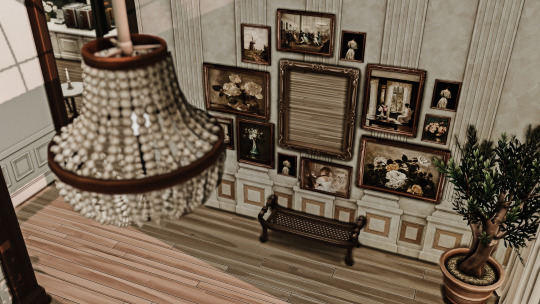
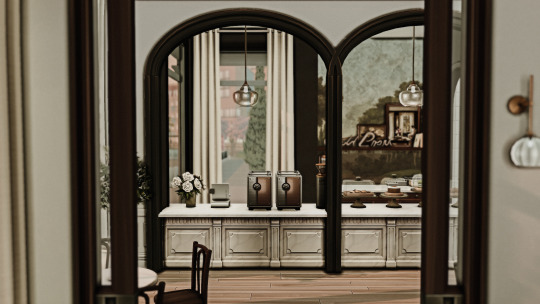
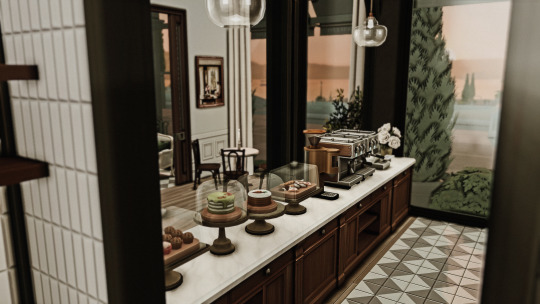
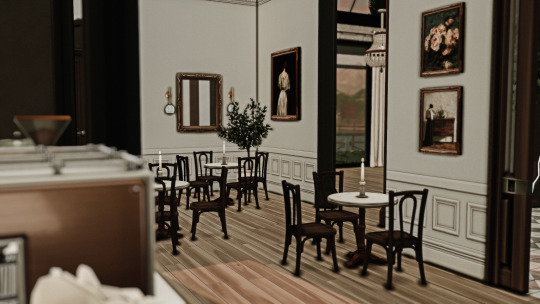
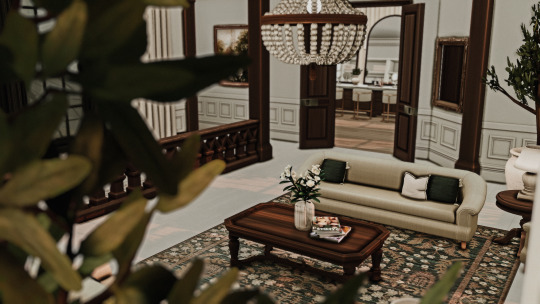
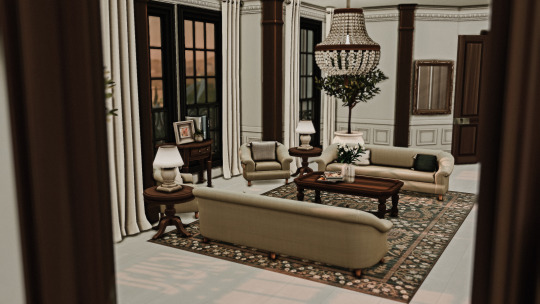
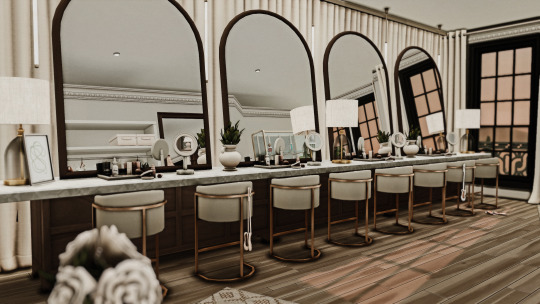

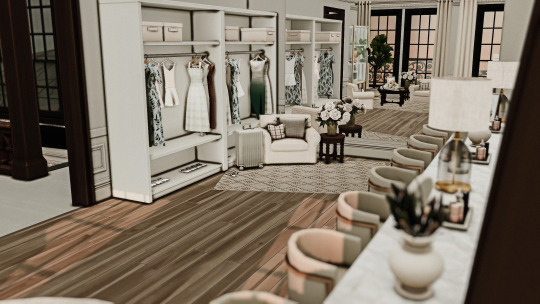
Grace Dance Studio ♥ The Sims 4: Speed Build // CC
➽ Hello guys, today I am building a Dance Studio in the Sims 4. Grace Dance Studio is owned by Madame Cecilia Grace, a well-known dancer, choreographer, master ballet teacher and performer in Windenburg. This beautiful dance studio is home to both competitive and non-competitive dancers and provides training to help students and passionate dancers accomplish their dance goals on and off the stage.
➽ I placed this as a Generic Lot as we don’t exactly have a Dance Studio Lot type, so it’s all just pretend. This lot could also be set as a Café as it meets all the requirements to function as one.
● Please make sure to turn bb.moveobjects on!
● Please DO NOT reupload or claim as your own.
● Feel free to tag me if you are using it, I love seeing my build in other peoples save file
● Feel free to edit/tweak my builds, but please make sure to credit me as the original creator!
● Thank you to all CC Creators
● Please let me know if there's any problem with the build
➽ SPEED BUILD VIDEO
0:02 Intro
1:44 Speed Build
19:21 Photos
➽ LOT DETAILS
Lot Name: Grace Dance Studio
Lot type: Generic lot type or Cafe
Lot size: 30x20
Location: Windenburg
➽ MODS
Tool Mod by Twisted Mexi
*I recommend Downloading: Sims 4 Ballet Barre Mod and the Ballroom Dance Mod by Mercury foam*
➽ CC LIST
Note: I reuse a lot of the same cc in all my builds, specifically cc's from felixandre, HeyHarrie, and Pierisim so if you're interested in downloading past, present, future build from me i suggest getting all their cc sets to make downloading a little easier! other creators include Sooky, Charlypancakes, Sixam, Thecluttercat, Myshunosun, awingedllama, and tuds. This will also ensure that the lots are complete and are not missing any items upon downloading !
Awingedllama: Apartment Therapy
Lustroussims: Cozy Cottage [hanging aprons only]
Novvas: Rahat Set [poster II only]
Severinka: Monica Bathroom [wall lamp only]
Sooky: Horizontal Oil Painting - Portrait, Horizontal Oil Painting - Still Life, Tiled Floor Collection, Vertical Oil Paintings – Landscape, Vertical Oil Painting – Portrait, Vertical Oil Painting – Still life (LINK for ALL)
The Clutter Cat: Sunny Sunday pt 2 [ mirror only]
Charly Pancakes: The lighthouse Collection, Chalk pt 2, Lavish, Maples &S Construction
Felixandre: Chateau [all] , Colonial pt [1][2][3], Fayun pt 2, Berlin pt [1] [2] , Florence [all], Georgian, Grove pt [4], Kyoto pt [2], Paris [all], Grove pt [1][3]
House of Harlix: Harluxe, Jardane, Livin Rum, Orjanic pt [1][2]
Harrie: Brownstone [all], Brutalist, Coastal pt [2][5], Octave pt [2], Country pt [2], Spoons pt [2], Shop the look, Kichen
Cowbuild: Blooming Garden Café
Leafmotif: Calliope Bathroom [wall light only]
LittleDica: Rise& Grind
Littlecakes: Flowers (big ass roses)
Madameria: Basic Luxe [bar stool only]
*MOD*Mercuryfoam: Ballet Barre
Myshunosun: Daria Bedroom, Simmify pt [2]
Peacemaker: Hamptons, Pattered Jute Rugs, Terra tiles
Ars Bortanica: Peonies bouquet
Pierisim: Coldbrew [all], Domain Du close pt [2] [3], MCM pt [1], Oak house pt [3], The office, Winter Garden pt [1]
CharlypancakesxPierisim: Precious Promises
Ravasheen: Catas Throphy style [1][ 2][ 3], Skewllskewl highschool Décor
Rustic Sims: Modular life
Sforzinda: Func EP02 Espressogrindomatic
Simplistic: Rug Holland
*MOD* Simsten: Playable Harp
Sixam: Hotel bedroom [table only]
Syboubou: Ballet
● TRAYFILE
● Origin ID: Applez
● Twitter: Rheya28__
● Tiktok: Rheya28__
● Patreon: Rheya28
● Youtube: Rheya28__
323 notes
·
View notes
Photo










IL DUOMO DI MONREALE IN UNA PUBLICAZIONE DI INIZIO SECOLO
In questo giornale di inizio 1900, la cattedrale di Monreale è rappresentata con i mezzi di allora e quindi le sue tessere d’oro e la sua luminosità solare si è persa nel grigiore oscuro dell’inchiostro. Questa differenza tra la bellezza reale, dorata e luminosa, e quella rappresentata, buia e triste, mi ricorda la differenza tra la vita come dovrebbe essere e quella attuale. Tra la vita nella pace e quella delle guerre quando non è più il motivo per scrivere credendo nell’uomo. Troppe guerre, troppi morti, troppi orfani mutilati e madri senza più figli. Siamo tutte pedine mosse dal potere del male, illusi con motivazioni ridicole ad accettare, a donare sangue e speranze insieme ai nostri domani. È come se ogni cosa perdesse colore, come se i cieli si oscurassero e le primavere si vestissero a lutto e tutto, tutto quanto diventasse il grigiore che precede il buio. In questa nevicata oscura, scrivere d’amore e dei fiori della gioia, pare un insulto, come schiuma del mare colorata di sangue. Il dolore non ha un passaporto, l’ingiustizia non ama nessuno e a tutti ruba tutto: alle vittime la vita, ai carnefici la loro umanità. I versi perciò sanno di fango, le parole non sono più tessere d’oro nella magnificenza di un mosaico, ma solo la fuliggine di un fuoco infernale, l’arsura degli assetati, l’impotenza amara dei padri, le lacrime acide delle madri. Le parole diventano bossoli vuoti, avanzi di vita, orme nella sabbia o nella neve di chi non c’è più. La luce abbandona ogni cuore e spegne le chiese, le anime, prosciuga la gola e spinge i poeti e i sognatori a nascondersi nel profondo della terra per pagare anche loro il loro prezzo alla follia della storia.
In this OLD newspaper from the early 1900s, the Monreale cathedral is represented with the means of the time and therefore its gold tiles and its solar brightness have been lost in the dark grayness of the ink. This difference between the real beauty, golden and bright, and the represented one, dark and sad, reminds me of the difference between life as it should be and what it is now. Between life in peace and that of wars when it is no longer the reason to write believing in man. Too many wars, too many deaths, too many mutilated orphans and mothers with no more children. We are all pawns moved by the power of evil, deluded with ridiculous motivations to accept, to give blood and hopes together at our tomorrows. It's as if everything lost color, as if the skies darkened and the springs dressed in mourning and everything, everything became the grayness that precedes the darkness. In this dark snowfall, writing about love and the flowers of joy seems like an insult, like sea foam colored with blood. Pain does not have a passport, injustice loves no one and steals everything from everyone: the victims' life, the executioners' humanity. The verses therefore taste like mud, the words are no longer golden tiles in the magnificence of a mosaic, but only the soot of an infernal fire, the thirst of the thirsty, the bitter impotence of fathers, the acid tears of mothers. Words become empty shells, leftovers of life, footprints in the sand or snow of those who are no longer there. The light abandons every heart and extinguishes churches, souls, dries up the throat and pushes poets and dreamers to hide in the depths of the earth to also pay their price to the madness of history.
15 notes
·
View notes
Note
I just took your uquiz (got Madhouse at the End of the World) and I'm obsessed - I think I might have found a new special interest!!! Please talk polar expeditions to me, I'm foaming at the mouth, absolutely feral. Just infodump like crazy please, I'm on my knees and begging
I'm so glad you liked the quiz!!
Apologies for turning this post into a larger primer!
I hope you enjoy Madhouse--secretly I think it's the best result on the quiz (though it's not my own result; that's A First-Rate Tragedy). Madhouse has a bit of everything & if you're looking for truly insane anecdotes to regale your friends with, it's your best bet. A smattering of what you'll find in Madhouse: an army of rats, toxic gases sickening the expedition leader, scientists drawing cartoons about poop and butts, a man being mistaken for a seal at the worst possible time, brutal disregard for cats by a man who would go on to co-found the International Astronomical Union, the invention of light therapy, really bad uses of petroleum jelly....& that's just scratching the surface! And it all takes place during the first overwintering in Antarctica. thisisfine.gif
The one downside (not a downside depending on your perspective) for Madhouse as a starter book is it has nothing to do with Shackleton or Scott, and you'll soon find the majority of the English-language books on the Heroic Age, for better or worse, relate to those two. Madhouse DOES have a young Roald Amundsen (later the first man to the South Pole), who is a FASCINATING figure, and his first trip to Antarctica was often overlooked before this book afaik.
So I chose my three books for the starter quiz very carefully. Madhouse at the End of the Earth by Julian Sancton, A First-Rate Tragedy by Diana Preston, and Endurance by Alfred Lansing are all accessible secondary sources. They are readable (not overly academic) & don't require background info, doing a good job introducing people and terms (polar exploration has a whole associated vocabulary). Just as importantly, they're all exciting & well-paced & gripping! Once you've found your bearings, there's a whole specialist literature of polar history for polar scholars and enthusiasts. Broadly, I break it down thusly:
- Primary source expedition narratives: firsthand accounts of expeditions by people who were there. Within this there are a few subcategories: books always intended to be written by explorers when they returned home (this was a significant source of income for expeditions), like Scott's The Voyage of the Discovery, Mawson's Home of the Blizzard, or Shackleton's The Heart of the Antarctic. There's books not-originally-intended but the author decided to write them years later (The Worst Journey in the World by Cherry-Garrard, Saga of the Discovery by Bernacchi). And then there's diaries that were never intended to be published--often, they were written for the explorer's family, or perhaps to help the expedition leader write the narrative. But they weren't meant to be published verbatim. Time, fame, tragedy, and general interest sometimes led to them eventually seeing publication--this is especially the case for a lot of the Terra Nova diaries, & was most famously done for Scott's own diary, which he had intended to edit into a book, but not to publish in raw form. Providence, of course, had different ideas.
- Secondary source expedition narratives: Madhouse and Endurance from my quiz both fit this category, for the Belgica and Imperial Trans-Antarctic (better known as the 'Endurance') expeditions, respectively. (First-Rate Tragedy I'd moreso call a Scott biography). These are accounts of expeditions written by authors/historians who were not on the expeditions in question. There's a LOT of these, and they vary widely in quality. Some offer new scholarship or cover something that hasn't been covered before; others are...less rigorous. Have a browse at your local thrift store/charity shop/secondhand bookstore. If you're lucky they'll have some polar books. Flip through and see if there's a robust citations section, or footnotes, and ideally in-text citations for quote attributions. This can give you some sense of the quality as you're wading into the sea of books!
- Biographies: Exactly what it says on the tin! Instead of picking an expedition to focus on, these books are about one explorer and his life (almost always "his", though there are a few exceptions like Ada Blackjack). There are, once again, a lot of these! Scott and Shackleton in particular have a lot of biographies. I personally didn't read many biographies before this obsession, and I find them a really interesting format in which the biographer is important too, not just the subject. I'm developing opinions about when and how biographers should include relevant cultural context, the amount of the author inserting their opinion that I prefer and how it should be indicated in the text, etc. Similarly for the secondary sources above, check the indices and citations. I'm constantly flipping back to check sources while reading, one of the reasons I prefer physical to e-books!
- Other: There's always another category, isn't there? There's tons more! Cultural histories like Spufford's I May Be Some Time: Ice and the English Imagination (I recommend you get a few books under your belt before reading that to get the most out of it), travelogues mixed with history like Sarah Wheeler's Terra Incognita, Bea Uusma's The Expedition which flips back and forth between time periods, & more!
Like any taxonomy, there's flaws with the above, and things that don't fit, but that's broadly how I see the landscape!
Tips, tricks, & things to know:
- Polar books are most often found in the "Travel" or "Travel Literature" section. Sometimes you can find stuff in "History" "Biography" or even "Sports" lol. A parallel interest is Mountaineering, so if a place has Mountaineering books, they may well also have polar.
- It can be very helpful to familiarise yourself with the Edwardian era in general -- it's a fascinating cultural history in and of itself, and its the most modern era before the great global "end-of-innocence" of the First World War. Sometimes the things these guys are up to really ARE crazy, sometimes it's just that they're Edwardians and something is lost in the translation.
- Like many subjects historians have been writing about for over a century, polar exploration history authors have their biases. The most common one is whether or not the author likes Robert Falcon Scott. This goes back to a controversial book called Scott and Amundsen, published in 1979 by Roland Huntford. (It's also found under the title The Last Place on Earth, based on its TV show adaptation.) Huntford retells the "race to the South Pole" elevating Amundsen and in the process doing a very good job of destroying Scott's reputation by debunking him as an incompetent bungler. From what I've heard from others (I haven't read it yet, though will eventually for its historiographical value) it's a good source on Amundsen but everything he says on Scott should be ignored due to highly selective quotations and...well, active malice toward the guy. Basically, it's a callout-post/bombshell of a book that has had almost every subsequent historian touching on the topic going to great lengths to debunk in turn. Fwiw, I've also heard people say Huntford's Shackleton biography is good. Just. Don't listen to him about Scott.
- Imperialism motivated a lot of these expeditions, and frankly in my opinion this is something more of the literature NEEDS to talk about! A few that do a good job are Spufford mentioned above, & Larson's An Empire of Ice.
- I'd actually recommend don't start with diaries, bc they usually need some context to understand. Exception? Scott's final entries.
There you go! Happy reading! Also check out @areyougonnabe, she's got some great polar posts!!
#polar exploration#and I didn't even touch on the fictional adaptations#sorry this probably isn't want you wanted but its what ive written!
26 notes
·
View notes
Text
Unnatural (v2-8)
(Chapter List)
MATURE CONTENT WARNING : This story deals with some disturbing themes. Check the tags. IF any of these are triggers for you or will disturb you... then DO NOT READ!!
Jaune in his Anna form easily slipped thorough the shadows around the secured entrance of the apartment block’s entrance. The one she was after wasn’t the only perverse vermin inside the building. The place was ripe with potential prey, but they could wait. Jacob Dahmer was the target. Anna started up the stairs. Her destination, the third floor. On the first landing, she met… a delay.
“Hey sweet thi…” the man’s pickup line was cut short by his face impacting the wall, with the crunch of his nose breaking.
“You bit…” His associate’s comment was cut off as just as quickly when the back of his head bounced off the wall, causing him to slide limply to the floor.
“I don’t have time for your pathetic shit.” Anna commented as she moved past the two now unconscious young men.
On the second floor landing, she ran into another group of young people loitering about. This time, a malicious grin flashing her shark like teeth caused the gathered collection of a couple of guys and a few girls to all to back off. Unmolested, Anna continued her climb, and soon found herself standing outside the entrance door of her destination.
/==/
“So Annabel is targeting your ex?” Saphron asked, a little surprised at Terra’s admission after being asked, is she knew where Jaune was going. “That doesn’t make sense. Annabel only…”
“I never told you… but he was abusive, and I happened to get pregnant…because… because…” tears welled up in Terra’s eyes as her words began to get choked off due to her rising emotions.
“He caused you to miscarry?” Saphron asked softly as she pulled her into a warm hug. Terra only nodded, unable to form words. “It all makes sense now.”
/==/
Upon seeing the rundown and filthy nature of the apartment’s interior, coupled with the near cloud of corruption scent in the air, Anna growled. Moving further into the unit, she found Jacob’s current girlfriend on conscious on the couch. The bruises were fresh, as were the needle marks in her arm. Anna was seething now, as she began to use her enhanced sense to locate her quarry. The minute whimper of “No, stop. Mom?” drew Anna towards the back bedroom.
The door was closed, but she could easily hear the sounds of two people moving about. She could also hear their breathing, and knew the difference. One was panicked, fearful. The other was even, calm, almost aroused. Before Anna could act, Annabel forced her way forward, replacing her,
“It’s time to play.” Annabel snarled as she stepped into the shadows and melted from sight. She rematerialized inside a dirty and cramped room. Even in the dim light cast by the single shaded bedside lamp, she could see everything.
“Where’s mom?” a thin waif of a preteen girl asked in a shaking voice.
“She’s drugged out of her mind, like always, girly.” the male spoke, his tone dark and lecherous. “So why don’t you and I play while she sleeps it off. Behave and I’ll buy you that dress you want.”
“Stay away.” the preteen whimpered as she tried to back away from the approaching figure of the thin, disheveled, a sloppy looking older man.
“Don’t be like that, baby. We’ll have a good time… I’ll make sure you feel…” his words were cut off with a gurgling cry of pain, causing his intended victim to freeze in fear.
“So you like to play with young girls, do you, Jacob Dahmer?” came a sinisterly malicious voice from behind him. “So shall we play?”
Jacob tried to respond, but could only gurgle. Bloody foam and spittle spraying from his mouth. He couldn’t breathe, and his entire attention was on the pain in his upper back. He gagged and let out a gurgling sound as the sound of snapping bone filled the room, at the same instant he lost all feeling below his waist. A moment later, he found himself laying in a crumpled heap on the floor. Struggling to breathe, he watched wide eyes as a teenaged girl walked over him and towards the daughter of his girlfriend.
“What’s your name?”
“Daisy.”
“Daisy, I’m Annabel and I came to save you, but you have to do something for me, well two things, okay?”
“Like… what?” Daisy asked in a meek and terror filled voice.
“I want you to call Emergency Services, and tell them to come here. You need to help your mother, and yourself. Can you do that?” Daisy nodded, “Good, now I want you to tell me something… I want you to be honest, because I will know if you are lying.”
Daisy nodded again.
“Do you want Jacob to go away, forever? Do you want me to hurt him for hurting you and your mother?”
“Y… y… yes.” Daisy replied.
“Would you like to watch me hurt him?”
“Will he… die?”
“He will.”
“Yes.”
/===/
A/N : So One more post before Volume 2 is complete. This one is not one of my better posts. Sticking point is how to reconcile Terra - Saphron - Jaune, considering that Jaune/Anna/Annabel is a mass murders(serial killer). While his mother accepts/condones it... I need to think/figure out a way that Terra might not condone it, but at least accept it without feeling the need to turn Jaune in?
#Discretion Advised - MATURE CONTENT#rwby#jaune arc#annabel#anna arc (OC)#saphron cotta arc#terra cotta arc#jaune is saphron's son#demonic possession#disturbing content#warning: implied/referenced incest#warning: implied/referenced rape#warning: implied/referenced child abuse
7 notes
·
View notes
Text
Transcript Episode 87: If I were an irrealis episode
This is a transcript for Lingthusiasm episode ‘If I were an irrealis episode’. It’s been lightly edited for readability. Listen to the episode here or wherever you get your podcasts. Links to studies mentioned and further reading can be found on the episode show notes page.
[Music]
Lauren: Welcome to Lingthusiasm, a podcast that’s enthusiastic about linguistics! I’m Lauren Gawne.
Gretchen: I’m Gretchen McCulloch. Today, we’re getting enthusiastic about how languages express unreality. But first, thank you to everyone who celebrated our anniversary month with us.
Lauren: We always enjoy seeing what you recommend to people and thanking you for doing that. If you did that not on social media, in your own private media channels, thank you very much. You can share Lingthusiasm with anyone who needs more linguistics in their life throughout the year.
Gretchen: Our most recent bonus episode is a conversation about swearing in science fiction and fantasy with Ada Palmer and Jo Walton.
Lauren: I was so excited to hear you talk to two of our favourite authors. We’ve talked about Ada Palmer’s Too Like the Lightning and the Terra Ignota series before. We’ve talked about Jo Walton’s Thessaly books. Getting to hear you talk to them about swearing in fantasy and in science fiction was a whole lot of fun.
Gretchen: This was so much fun. We also have several other bonus episodes about swearing more generally as well as a massive archive of bonus episodes if you’re looking for something to do, and you wish there were more Lingthusiasm episodes, or you just wanna help us keep making the show. Those are there. You can go to patreon.com/lingthusiasm to get access to our full archive of bonus episodes for yourself, or they make a great last-minute gift idea.
[Music]
Lauren: Gretchen, what is real?
Gretchen: That’s a big philosophical question, Lauren, “What does it mean for something to be real?”
Lauren: Mm-hmm. But we could also answer it linguistically.
Gretchen: We could, indeed. Languages have lots of ways of talking about things that aren’t real. Sometimes, this itself can get tricky. If you want to start a fun discussion among your friends at the dinner table, try asking them things like, “Is a toy sword a real sword?”
Lauren: Hmm, I can totally see a context where you’re playing with toy swords – or maybe those big foam swords that people use in live-action role playing. In that context, it’s a real sword. You’re like, “Please don’t hit me with your sword,” or “I’m gonna practice my sword work.”
Gretchen: It is more of a real sword than a mimed sword or an entirely imaginary sword. It is real as in you can touch it, but it is not real as in it could cut people. One of my friends has a cheese plate that comes with these delightful small swords and daggers and axes that you can use to cut cheese with.
Lauren: Cute.
Gretchen: Which is great. This is, by some definitions, a “real” sword because you can cut things with it even if those things are cheese.
Lauren: Probably taken away from you as a weapon if you try to take it on an aeroplane.
Gretchen: Are we letting the airplane security people decide what a real sword is? The solution to all of our philosophical questions is just answered by airline security people.
Lauren: I’m taking a really weird range of stuff to the airport next time I travel just to check what is real. But then there are things that exist but not in this reality. So, Excalibur is a famous sword. But is it a real sword?
Gretchen: Right. Probably there’s a museum somewhere that has something that claims that it’s Excalibur. It certainly is a sword that has a bunch of cultural connotations with it – that has a level of reality that’s different than a magical sword that someone just makes up as a fantasy novel writer for their own novel but doesn’t have a broader cultural existence.
Lauren: I feel in some ways it’s more real than a foam sword or a cheese plate sword because it is more prototypically sword-like in my head. Could you imagine if Arthur went around with a cheese plate-sized sword or a foam sword? That’s the version of King Arthur I’m gonna rewrite.
Gretchen: I recently saw a production of Macbeth in which – so Macbeth has this famous speech which starts, “Is this a dagger that I see before me?”, and he’s not sure if he’s hallucinating or not. He’s about to kill the king, and he’s feeling guilty about it.
Lauren: He’s not sure if it’s just a cheese board.
Gretchen: Is it just a cheese dagger? In this production – which was also interesting because all of the characters were dressed up as goblins, but that’s a whole other thing.
Lauren: Uh, okay.
Gretchen: We’ll get to that in a sec.
Lauren: Sure.
Gretchen: The staging represented the dagger, at first, as a beam of light – like a tightly focused spotlight – in front of Macbeth, and everything else on the stage was all in red. There was this beam of white light. You’re saying, “Is this a dagger that I see before me?”, and you’re seeing this beam of light. In that context, the audience is supposed to be believing that Macbeth is hallucinating. Then the actor pulls out a prop dagger that I’m sure was probably not very sharp to subsequently be the murder weapon that he’s gonna go kill the king with. So, “Is this a real dagger? Is this an unreal dagger?” Different productions approach this question of “Is Macbeth seeing something real or not?” in different ways.
Lauren: The prop dagger is more of a real dagger than the beam of light dagger. And in the play, it stands in as a real dagger, but it’s less of a real dagger than a sharp one that might stab someone.
Gretchen: Right.
Lauren: I’m keeping track.
Gretchen: Exactly.
Lauren: Just to be clear – were they real goblins?
Gretchen: Well, [laughs] I certainly felt like I had just seen some goblins perform Macbeth. I had to keep reminding myself, like, no, they’ve just got costumes on because, man, those costumes were really great. The actors came out into the lobby and interacted with the audience before and after the show, so they felt –
Lauren: As goblins? In character?
Gretchen: As goblins in character.
Lauren: Okay.
Gretchen: Sort of improvising. They felt like they were real goblins. Then I’ve had to explain this show to other people, and they’ve been like, “So, wait, were they humans in the play?” And I was like, “No, it’s complicated. It all made sense at the time, though, I promise.”
Lauren: Amazing. I do have a moment of caution because goblins aren’t real in our world, but also, goblins have been used by a bunch of 20th Century fantasy writers to stand in for, for example, Jewish people in not always the most sensitive or appropriate way. Is that something that was happening here? I say with caution.
Gretchen: No, thank goodness.
Lauren: Okay.
Gretchen: One of the things you can do with something that has a cultural reality is the characters are very careful to say, “These other writers – you may have heard other things about goblins – they were all wrong. We’re the real goblins, and we’re gonna tell you the real story of goblins, which is not at all antisemitic” in the context of the actors wanting to do this play.
Lauren: Okay, so they were more real fake goblins than the fake fake goblins of fantasy.
Gretchen: Exactly. They were laying claim to being the real goblins and being like, “No, these other authors have said nasty things about this, but that’s not who we are.”
Lauren: Hilarious.
Gretchen: Which is something that you can do with something that has a cultural level of reality. “If I had a dog” is a hypothetical statement, but dogs are real.
Lauren: You could have a pet dog if you wanted to.
Gretchen: “If I had a dragon” is also a hypothetical statement, but it has a different level of hypothetical reality.
Lauren: You could put a little costume on a lizard, but yeah, you’re not getting a pet dragon of fire-breathing, winged fantasy fame.
Gretchen: Well, but maybe I have a dragon plush toy, which is a real dragon that I could have.
Lauren: True. Much easier to feed than a real dog or lizard.
Gretchen: My house insurance is a much bigger fan of me having a stuffed dragon. Those have a different level of reality compared to if I say, “If I have a frenumblinger” –
Lauren: If you have a what what?
Gretchen: Well, a “frenumblinger,” clearly, which is the creature that makes it not rain when you bring an umbrella.
Lauren: Ah. I absolutely always take an umbrella everywhere with me, but I didn’t realise I was appeasing this particular deity.
Gretchen: Well, if only you’d realised you were appeasing the frenumblinger – which is a creature that we made up that doesn’t have a cultural reality beyond this podcast.
Lauren: Dragons are more real than frenumblingers, even though both of them are not real.
Gretchen: Yeah. Reality itself is a continuum and depends on the context that you’re talking about.
Lauren: It’s so great that language lets us talk about things that aren’t here and aren’t real.
Gretchen: And that may or may not be real in the future.
Lauren: A lot of the time, we do this with words – like something being “not real” or “There might be dragons.”
Gretchen: Or “fake” or “toy” or things like that – “imaginary.”
Lauren: But languages can also use grammatical marking as part of a way of showing whether something’s real or not in the way that we do our grammar.
Gretchen: This is referred to with a delightful name, which is the “irrealis.” There are various kinds of irrealis markers that happen at a grammatical level in addition to all of the ways you can use words to talk about things that are imaginary or pretend or fake or constructed.
Lauren: There’s lots of different ways that we talk about the “slipperiness” of reality in language. We’re gonna talk about the grammatical structures of irrealis for the rest of this episode.
Gretchen: We’ve talked about stories and deliberately imaginary or fantastical contexts, but there’s also lots of places in everyday language where we wanna talk about things that haven’t happened and may never happen but might happen. We wanna talk about them.
Lauren: For example, “If it rains, I bring an umbrella,” regardless of whether I believe in frenumblinger.
Gretchen: That’s a relatively here and now if-then statement. We can also say, “If it rains, I will cancel the picnic,” which is something that’s even more hypothetical.
Lauren: Disappointing, but fair enough if we have to do that.
Gretchen: You can have more hypothetical conditional statements like “If all the raindrops were lemon drops and gum drops, oh, what a rain that would be!”
Lauren: That sounds horrifying.
Gretchen: Wait, do you not know this children’s song?
Lauren: I do not know this children’s song. It sounds like the start of an apocalypse.
Gretchen: “If it had rained lemon drops and gum drops, the plants would’ve been crushed under the weight.”
Lauren: Not to mention us. I don’t think my umbrella’s gonna be much help here.
Gretchen: Not to mention the effects on the water table.
Lauren: Oh, gosh. This is an absolute ecological apocalypse here. How terrifying.
Gretchen: Conditionals can be used to talk about both relatively realistic hypothetical events – and also very fantastical ones.
Lauren: I’m gonna go listen to this song after this, but I am already scared of it.
Gretchen: You’ll be even more excited to learn that the second verse goes, “If all the snowflakes were candy bars and milkshakes.”
Lauren: How are we even gonna produce that many candy bars and that much milkshake?
Gretchen: “Oh, what a snow that would be!”
Lauren: Indeed.
Gretchen: My favourite type of conditionals are not candy bars and milkshakes, they are, in fact, biscuit conditionals.
Lauren: Delightful.
Gretchen: Going from one food to the next. So, this is a famous example from J. L. Austin, who has the statement, “There are biscuits on the sideboard if you want them.”
Lauren: Oh, thanks, but where are biscuits if I don’t want them?
Gretchen: [Laughs] This is the thing because in these examples of “If it rains, I bring an umbrella,” if it doesn’t rain, maybe I don’t bring an umbrella, or maybe I bring one just in case to appease frenumblinger – compared to “There are biscuits on the sideboard if you want them, and if you don’t want them, well, where are they?”
Lauren: There are lots of different relationships between the first half and the second half of a conditional. I do like that biscuit conditionals set you up for a really great mom joke there.
Gretchen: There’s a related xkcd comic which goes, “I’ll be in your city tomorrow if you want to hang out.”
Lauren: “But where will you be if I don’t want to hang out?” I do actually wanna hang out.
Gretchen: I wanna hang out, too. But yeah, this sort of “What happens with the other half of the ‘if’?” This is one of the tricky things about talking about hypothetical events that there are lots of different ways of getting into that hypothetical.
Lauren: Which is why the caption on the xkcd comic is “Why I try not to be pedantic about conditionals.”
Gretchen: Very important.
Lauren: A good motto to live by. A lot of conditionals are slippery when the hypothetical part is in the future, and that’s because the future is quite difficult. It is unknowable by its very nature because we have a linear progression of time. That means that the future and irrealis bump up against each other in really interesting ways.
Gretchen: Right. If you make a statement – a relatively unremarkable future-y statement – like, “I’m probably gonna go to the store tomorrow,” or “I want to bake a cake tonight,” these are fine. These express a future or a desired future, but if you make the past equivalent – so instead of “I’m probably going to the store tomorrow,” “I probably went to the store yesterday.”
Lauren: Are you okay?
Gretchen: Like, was I sleepwalking? Was I consuming a substance that made me forget things?
Lauren: Do you have amnesia?
Gretchen: That’s suddenly a much weirder statement. “I want to bake a cake tonight,” fine. “I wanted to bake a cake last night” is fine, but it implies that it didn’t actually happen. Like, “I wanted to bake the cake last night. In fact, I did bake one.” Okay. Well, why didn’t you just say, “I baked a cake last night?”
Lauren: For sure. In fact, this is where English “will” for future came from. Something like, “I will bake a cake” originally meant something much more like, “I want to bake a cake.”
Gretchen: You still get, I think, sometimes these older, tiny things like, “I know it’s gonna happen. I will it.” That’s the same “will” in origin. The wanting intensely is that future “will” – it became that future “will.”
Lauren: The way that “will” is turning into something much more grammatical in the English future is a nice example of how different languages will sometimes use words and sometimes use grammar for these less-real irrealis contexts.
Gretchen: English still has grammatical past – “I baked a cake last night” – which is different from “I bake a cake right now.” But in some languages, instead of having a past/non-past like we have in English, what you actually have is a realis/irrealis where you have one form of a verb to talk about things that have happened or that are currently happening – any version of it that’s real – and then you have another form that’s talking about any version of it that’s unreal, whether that’s future or hypothetical or that whole class of things. It also makes sense as a way of splitting the conceptual timeframe into things that I have evidence for actually happening and things that I don’t yet have evidence for.
Lauren: For example, Manam, which is an Austronesian language in Papua New Guinea, doesn’t have a tense distinction like past and present and future; it has a realis and an irrealis form. They’re all prefixes on the verb.
Gretchen: There’s one set of prefixes for realis, whether it’s like, “I’m doing this,” “You’re doing that,” “We’re doing this,” “They’re doing this,” and so on. And there’s one for irrealis, which is like, “I might,” or “I will,” or “We might,” or “They might,” or all of these groups of forms. Another example of a language that uses realis versus irrealis as a really important distinction is Terêna, which is a southern Arawak language spoken in southwestern Mato Grosso, Brazil. They have two different forms for every verb, which is “actual” and “potential” – basically realis and irrealis – that have different suffixes. You have things that are realis, which can be translated as stuff like, “He went,” or “when he went,” or “He will go,” which in this case is grouped with the realis.
Lauren: So, it’s definitely gonna happen.
Gretchen: The idea is it’s definitely gonna happen. Then, in the irrealis category you have things more like, “Let him go,” or “when he goes,” which is more hypothetical.
Lauren: What people segment up as realis and irrealis differs depending on the grammar of a language.
Gretchen: Exactly. In many cases, English uses just extra words like “will” or “want” or “let” or “if” to indicate that something is irrealis, but we do have a few verb forms that are also used for hypothetical events.
Lauren: One of my favourites involves both mid-20th-Century musicals and Gwen Stefani.
Gretchen: Great.
Lauren: In English, we have two different structures. We have “if I were a rich man.” That is a slightly different structure to “if I was a rich girl.”
Gretchen: Ah, so these are two relatively famous songs. “If I Were a Rich Man” comes from Fiddler on the Roof, which is a 1964 musical.
Lauren: And “If I Were a Rich Girl” is a Gwen Stefani song from 2004.
Gretchen: This immediately gives us these great dates for when these two forms were more popular – “if I were,” “if I was” – and then these two songs that are influenced by each other.
Lauren: This form that has “were,” instead of just the normal past tense “was,” is something known as the “subjunctive.”
Gretchen: Ah, the elusive subjunctive in English.
Lauren: It is elusive because it is changing into this regular past tense form as we see with Gwen Stefani’s “If I Was a Rich Girl.”
Gretchen: Right. Not everybody says the subjunctive in that context. It’s still optionally there. You have to do it in “if I were” or “if he were” because in all the other forms, “if you were,” “if they were,” “if we were,” it’s just the same as the past tense form. You have to use it with “I” or “he” or “she” – one of the forms that would use “was” in another context – to be able to see it show up, which is probably why it’s kind of fragile and disappearing.
Lauren: Yeah, I think so.
Gretchen: Can we try to do a little bit of antedating? Fiddler on the Roof comes out in 1964, but the title of the song “If I Were a Rich Man,” having now looked into it, was inspired by a monologue from 1902 by Sholem Aleichem, which was in Yiddish, and the title of that was, “Ven Ikh Bin Rothschild,” or literally, “If I Were a Rothschild.”
Lauren: So, I don’t have to speak Yiddish to know that they’re talking about the very rich American Rothschild family.
Gretchen: Yes. Something that I think is interesting grammatically about the title of this monologue, which is a great monologue because it all goes on about how he’s gonna build schools for all the poor children and stuff – it’s a great monologue – but is “ikh bin,” which is the same as the German form “Ich bin,” like “I am,” whereas the German subjunctive form in this context is “Ich wäre,” which is more like “I were.”
Lauren: Yiddish and German are related, but they’re already doing different things.
Gretchen: They’re already doing different things specifically with subjunctive. Yiddish is already following this trajectory that English is following where it’s getting closer to the more usual form for “I am.”
Lauren: And you’re just meant to know that it’s hypothetical because he’s not a Rothschild, and he’s not building schools.
Gretchen: Well, and you have this word “if,” yeah.
Lauren: I also did some antedating on Gwen Stefani’s version of “If I Was a Rich Girl,” which was on her debut solo album Love. Angel. Music. Baby. It turns out that it’s actually a cover of a 1993 song by Louchie Lou & Michie One, where they also sing “if I was a rich girl.” Already by the early ’90s in younger people’s speech you see the subjunctive slipping.
Gretchen: Who are Louchie Lou & Michie One?
Lauren: They’re a British female ragga/soul duo from London in the early ’90s and were linked to the film clip for this track because they’re clearly having a lot of fun with it.
Gretchen: They may have had their finger on the pulse of language change a bit sooner than Gwen Stefani in 2004.
Lauren: Yeah.
Gretchen: When I think about the connection between “If I Were a Rich Man” and “If I Was a Rich Girl,” I think of an a cappella mashup from the mid-2010s, which combines these two songs in a very fun music video from some very posh-looking British a cappella singers, which we can also link to because it reinforces – and I hadn’t really realised that “If I Was a Rich Girl” was actually playing on “If I Were a Rich Man,” and they’re using some of the same beats in the background of the song. I hadn’t realised there was a connection between those. I should say, when Gwen Stefani came out with that song, she’d already released some music, and she was already pretty wealthy. At the time, you got some newspaper commenters and so on who were saying like, “Isn’t it a bit disingenuous for you to be saying, ‘if I was a rich girl’? Because you are, in fact, a rich girl.”
Lauren: Yeah, but the lyric “if I were not the rich girl that I am so I can be an avatar for my unwealthy audience” doesn’t really have the same ring to it.
Gretchen: Gwen Stefani at the time explained that as she was talking about the time before she had found commercial success when she used to be broke – which, maybe, you know, okay.
Lauren: A different level of hypothetical there.
Gretchen: Two levels of hypotheticality.
Lauren: We’re seeing this really interesting development over the last century or so in English where the subjunctive is changing in English.
Gretchen: Sometimes people say that this is “losing the subjunctive,” but interestingly, in both cases, it’s a past form. “If I was” and “if I were” are both using the form that is associated with the past – “was” or “were” – to refer to an event that is very much not the past. In fact, it hasn’t happened.
Lauren: Ugh, this is why it’s so hard to learn it as a second language speaker.
Gretchen: The subjunctive is something that often comes up when people are learning languages like French, Spanish, Italian – in German, it’s called the “conjunctive,” but it’s the same thing, the conjunctive and the conditional – because these languages have more fully-fledged forms for the subjunctive that they use to express a range of meanings that English speakers know how to express but aren’t used to thinking as all of the same kind of thing. Sometimes, I think it must actually be really hard if someone speaks one of those languages first and is coming in and trying to learn English, and they’re like, “What do you mean I just have this one easy form that I use for all this stuff, and I have to learn, like, seven different ways of expressing it now?”
Lauren: [Laughs] For sure.
Gretchen: I think this must actually also be hard because English doesn’t have one unified subjunctive. We have a whole range of extra stuff. You can just use the subjunctive for all of them? That’s so easy!
Lauren: Yeah. I mean, you could be like me and whenever anyone talks about the subjunctive, in my head I just hear, “if I was-slash-were a rich man-slash-girl.”
Gretchen: I’m glad that you’re covering the full range of possible forms there with “was” and “were.” I remember feeling confused about this form in the classroom and trying to use the subjunctive where, a lot of the times, the context that you’re talking about things are very remote and seem kind of artificial. The thing that really made me feel more comfortable using the subjunctive and recognising it was just encountering it in the wild in a bunch of contexts where it was like, “Oh, yeah, this is what this has to mean.” There’s a particularly useful song for the French subjunctive, if you like, which is on a classic Celine Dion album from the 1990s.
Lauren: Excellent.
Gretchen: The song is called, “Pour Que Tu M’aimes Encore,” which is the title which translates sort of like, “So That You Love Me Again.” The “you love” is subjunctive. It’s hypothetical. It’s not the case, otherwise you wouldn’t have a song to write, but it’s saying all the things that the speaker would do so that the other person loves them again.
Lauren: Really looking forward to the Celine Dion/Gwen Stefani mashup that really helps people learn the French and English subjunctive forms.
Gretchen: Sounds great.
Lauren: The subjunctive is one of a set of different ways that we can talk about whether things are real or not. They’re also a subset of irrealis categories that are about trying to make the reality that you want to happen. There’s a great list on Wikipedia to check out. I feel like this was written by a linguist who is like me and remembers that there are different types of irrealis categories but never remembers their formal names.
Gretchen: This is definitely one of those cases when it’s like, if you know Latin, you just name everything with Latin roots, and then it sounds fancier than “the wish subjunctive” and the “want-to-make-people-do-things subjunctive.”
Lauren: Yes. We are gonna use the fancy names here, but like me, you’re absolutely not obliged to remember them. You can just click on the Wikipedia link whenever you wanna think about –
Gretchen: Every single time.
Lauren: Yeah. Let’s both pick our favourite two of these categories.
Gretchen: But, Lauren, we’re both gonna pick the “hortative” because it’s so cool!
Lauren: It is, and I just used it with “let’s.”
Gretchen: You just used it. “Let’s” both pick our favourite two subjunctive forms. The hortative is something that exhorts – it urges. It’s often found with “let” in English. Something like “Let us love each other,” “Let it snow,” “Let there be light” – imploring, insisting, or encouraging by the speaker. Sometimes, a language will have a specific form potentially used for the hortative, or this will be one of the categories that something like a subjunctive or another irrealis form can be used for. What’s one of your favourites if you can’t have the hortative?
Lauren: Well, if I can’t have the hortative, I will go for the category where an event is hoped for, expected, or awaited, which is the “optative.”
Gretchen: The “optative.” I want to opt into this coming event. Do you have an example of the optative?
Lauren: Something like, “May I be loved” or “May they get what they deserve,” which sounds threatening or hopeful depending on the context.
Gretchen: Can you use something like a “if only”?
Lauren: In Russian, to do something like the optative it would be literally translated as something like, “if only” – “If only she came back” – to do that expected or hoped for thing.
Gretchen: We have a “may something happen,” “if only something happened,” maybe “I wish something had happened.”
Lauren: I love Abkhaz – which is the language that Sarah Dopierala works on; we interviewed her for a bonus – I love that it has two different optative forms, and they both do slightly different things. In Abkhaz, you have Optative 1, which is to curse and to bless, and then Optative 2 is to express a wish, a dream, or a desire. The first one would be something like – the form of greetings is literally “May you see something good,” which is a blessing.
Gretchen: That’s a lovely greeting, yes.
Lauren: It’s a lovely greeting. I quite like. Optative 2 would be something like, “I wish she’d drink the water.” You get these two different forms that give you an idea of different ways you can do an optative.
Gretchen: I mean, I guess technically – we did a whole episode about the imperative, so that’s things like, “Drink the water,” and “See something good,” “Come back” – that is technically a type of irrealis because if you’re commanding someone to do something, it hasn’t happened yet.
Lauren: Ooo, yeah, so now you can go back and look into the whole imperative episode as an irrealis episode.
Gretchen: In principle, we could’ve done an entire hortative episode and an entire optative episode, but we decided to think about the macro category for a while first.
Lauren: My final category is one for when you’re not necessarily sure about the thing that you’re talking about, so you can’t be entirely certain if it’s real or not. This feature shows up in Yolmo. I wrote about it for my thesis. I wrote about it for a whole year before saying it. It turns out that I hate to say the word “dubitative” – /d͡ʒubɪtɛɪtɪv/?
Gretchen: /dubɪdəˈtɪv/.
Lauren: /dubətɪv/. /dubɪdətɪv/.
Gretchen: “Indubitatatative.”
Lauren: I’m very happy to write it for a year, and then I gave a presentation, and I was just like, “Oh, this is a problem.” But it is a grammatical category in Yolmo, and I do have to talk about it because it’s one that crops up in a whole bunch of languages. In English, we use a word like, “might,” you know, “I might make a cake,” “He maybe made a cake.” We use lots of different words for showing a lack of certainty. In other languages, it’s part of the grammar. In Ojibwe, which is an Algonquian language in North America, there is a specific suffix. The difference between saying something like, “aakozi,” meaning, “He’s sick,” or “aakozidog,” which is something like, “He must be sick; I guess he’s sick; Maybe he’s sick.” Like, “I can’t see inside this person’s head. I’m not a doctor. I can’t say for certain whether they’re sick, but they look pretty miserable.” I find having a grammatical form for whether you’re certain about something is so handy.
Gretchen: Technically, if you’d like, I did look up how to say this word. Oxford says /dubɪtɛɪtɪv/, but you know, language is pluricentric. You can say it however you’d like.
Lauren: I’ve definitely heard all of those different pronunciations from different people over time. I guess I will just continue to be uncertain about the way it’s pronounced.
Gretchen: Would you say you have “doubt”? Would you say you’re /dubɪtɛɪtɪv/ or /dubɪdətɪv/ about how to say “dubitative”?
Lauren: I would definitely use a dubitative grammatical form about my certainty about pronouncing it if we had one in English.
Gretchen: Excellent. I think my final form that I’m excited about – because I’m not counting imperative because we did a whole episode about that – I want to talk about a form that you can use to express a desire or a wish of the participant. If you wanna say something like, “I wish she loved me” – you have desire – you can use a /dəzɪdɹ̩ətɪv/ – I think that’s the only way it’s said. There are languages from Japanese and Mongolian to Sanskrit and Proto-Indo-European that all have desiderative forms of some sort.
Lauren: Aww. I like when a nice form crops up across a bunch of languages.
Gretchen: I think that that desire to try to impose order or predict what people are gonna say or what’s gonna be reality is part of what makes irrealis forms, like the subjunctive, complicated and confusing for people to learn is that they’re trying to talk about this whole class of events that haven’t happened yet and may or may not ever happen, which itself is confusing and chaotic to try to predict the future. It’s not the grammar’s fault that we’re using it to speculate about the unknowable.
Lauren: For sure.
Gretchen: One thing that we do know is that there is a fun etymology related to trying to impose order and predict the future of what people are gonna be like.
Lauren: I love a fun etymology story.
Gretchen: Have you ever wondered why the Greek Zodiac and the Chinese Zodiac are both called “zodiacs” even though one is months and the other one is years?
Lauren: I have never thought about this before. Is it something to do with the fact that – I mean, they both have cycles of 12 animals, so they definitely have a lot in common even though they don’t work on the same 12 rotation cycle.
Gretchen: Well, interestingly, it has nothing to do with 12, but etymologically, they come from the Greek “zodiakos kyklos,” or “zodiac circle,” which is literally a circle of little animals.
Lauren: Oh, “zo” as in “zoo.”
Gretchen: Yeah!
Lauren: But “diak” just is the diminutive “little”? Oh, that that is very cute.
Gretchen: Yeah, it’s “little animals.”
Lauren: How adorable.
Gretchen: There’re lots of tools that people use to make sense of the uncertainty or unknowability of reality in the future. Some of those tools are grammatical tools. Some of those tools are –
Lauren: Cute little animals.
Gretchen: Circles of little animals. Sometimes, that tool is etymology because people also use the origins of words to try to make sense of uncertainty even though etymology is also not destiny.
Lauren: We believe that so strongly that we made it into a sticker.
Gretchen: When you’re thinking about what’s real and what’s not real, when you’re wondering what’s knowable or unknowable, what’s certain or uncertain, the irrealis is a form that connects you through time and space to generations of other people who have also wondered what’s real.
[Music]
Lauren: For more Lingthusiasm and links to all the things mentioned in this episode, go to lingthusiasm.com. You can listen to us on all of the podcast platforms or go to lingthusiasm.com. You can get transcripts of every episode on lingthusiasm.com/transcripts. You can follow @lingthusiasm on all the social media sites. You can get scarves with lots of linguistics patterns on them, including IPA, branching tree diagrams, bouba and kiki, and our favourite esoteric Unicode symbols, plus other Lingthusiasm merch like our new “Etymology isn’t Destiny” t-shirts and stickers at lingthusiasm.com/merch. My social media and blog is Superlinguo.
Gretchen: I can be found as @gretchenmcc on Bluesky, my blog is AllThingsLinguistic.com, and my book about internet language is called Because Internet. Lingthusiasm is able to keep existing thanks to the support of our patrons. If you wanna get an extra Lingthusiasm episode to listen to every month, our entire archive of bonus episodes to listen to right now, or if you just wanna help keep the show running ad-free, go to patreon.com/lingthusiasm or follow the links from our website. Patrons can also get access to our Discord chatroom to talk to other linguistics fans and be the first to find out about new merch and other announcements. Recent bonus episodes include my excursion to linguistics summer camp, a.k.a. the LSA Linguistics Institute, a linguistics advice Q&A episode, and swearing in science fiction and fantasy. Can’t afford to pledge? That’s okay, too. We also really appreciate it if you can recommend Lingthusiasm to anyone in your life who’s curious about language.
Lauren: Lingthusiasm is created and produced by Gretchen McCulloch and Lauren Gawne. Our Senior Producer is Claire Gawne, our Editorial Producer is Sarah Dopierala, our Production Assistant is Martha Tsutsui-Billins, and our Editorial Assistant is Jon Kruk. Our music is “Ancient City” by The Triangles.
Gretchen: Stay lingthusiastic!
[Music]

This work is licensed under a Creative Commons Attribution-NonCommercial-ShareAlike 4.0 International License.
#linguistics#language#lingthusiasm#episodes#transcripts#podcast#episode 87#irrealis#morphology#syntax#semantics
6 notes
·
View notes
Text








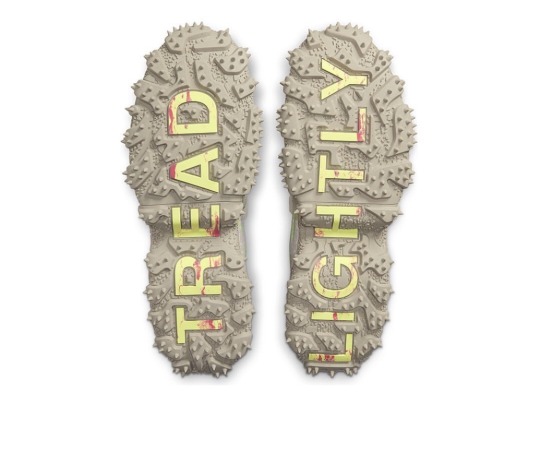
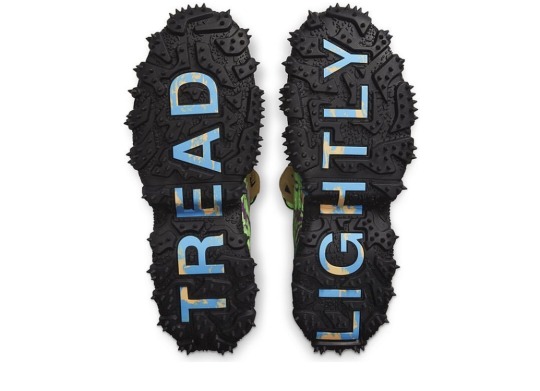
4 notes
·
View notes
Text
Chapter 2 rant will be out later, but I just...God, fucking queer rep in RWBY is a living nightmare and I just have to throw some thoughts out as a queer person.
You have a Nazi lesbian (Coco) who admits to check out women without their acknowledgement behind her sunglasses (ew tf). Another lesbian who's a terrorist (Ilia) and her main motivation was jealousy? Despite being part of an oppressed group? A singular catty gay man (Scarlet), and while that isn't necessarily bad, fucking hell it's still very annoying that he's the only gay person and is just written as an asshole. Background lesbians Saffron and Terra, not bad but again, bare minimum. A trans woman whose VA was treated like dirt. And 3 nonbinary characters, two of which are talking animals.
Like, how many characters does RWBY has? And this is it? This is the line up for queer rep that got you all foaming at the mouth for? This is below minimum effort, and it took them YEARS to actually confirm any of them as queer. RT was an independent company, they're not The Owl House or Legend of Korra where queer rep is constantly being squandered by higher ups, they just didn't want to.
And Blake and Yang...fucking hell. Preface, I have no problem with the Butch-Femme relationship between wlw characters. That's real life, I've seen plenty of gay couples where they didn't have a problem addressing themselves according to heterosexual labels (i.e. a gay man calling himself the wife). It still doesn't erase the fact that they're gay, and it's part of the identity.
What I fucking hate, HATE, is that neither Blake or Yang were written as the masculine queer woman initially. Both of them are femme, or were femme, but ever since the baiting begin Yang has been designated as the "man" of the relationship. This just felt extremely weird, since now you have Blake barely taking care of herself in dire situations and Yang standing up to her. Not very "we protect each other" like they claimed in Vol 6. Queer representation should not take away the characters' already established traits for them to be queer, that's lazy writing that reduces them to being nothing more than their sexuality.
All of this felt hollow; the queer characters are stereotypes or just assholes, and aside from their sexuality there's little to no substance to them. If you want substance, you have to spend time and money looking at supplementary works instead of those substances being written in the show.
What was Scarlet's life like? His relationship with Sage and Neptune, or his complicated thoughts about Sun? What about Saffron? What does she think about the rest of her family? Of the Arc family name like Jaune did? Speaking of Jaune, it's so easy to just let him be gender nonconforming back in Vol 2. But no, he must be masculine because God forbid a man wears a dress without transphobic jokes being made at his expense.
TLDR: RWBY's queer rep is boring at best, abysmal at worse. The characters felt hollow, and the effort that went into making them queer is nonexistent. And personally speaking? If South Park managed to support gay rep in the 90s, an independent company that created a show decades later have no excuse of not trying to say "this character is gay" from the get go.
#rwde#long post#and the majority of RWBY's queer rep are women#queer men doesn't exist here#or else they might get laughed out of existence#but ya'll ain't ready for that convo
41 notes
·
View notes
Text
ABOUT ME

Theater nerd, girly girl aesthetic, shit on religons for a religon, music junkie, natrual nail freak, fashionista, self proclaimed makeup guru, stunna girly girl, too many journals in counting, pro mental health, self- help, self love, bdsm whore, love to those who inspired me in all i do and think, put yall on to everything, skin care bitch, obsseing over books, big sister of tumblr who is regina on the outer and karen at her core, vent, talk, rant and sqeul on this page <3 <3 <3

Run for it makeup:
- Jelly pop elf primer
- Hydro grip Milk Primer
- Kosas Concealer
- Glossier blush Dawn/Dusk/Spark
- Glossier Lash Stick Brown
- Glossier Grooming brush pomade
- Glossier No.1 Pencil Muse
- Glossier Sky Wash lid tint Echo/ Terra/ Valley/ Palm/ Lawn
- Charlotte tilbury Wands
- Lip Cheat Pillow Talk
- Mac velvet teddy
- Rare Beauty Blush
- Rare Beauty Highlighter
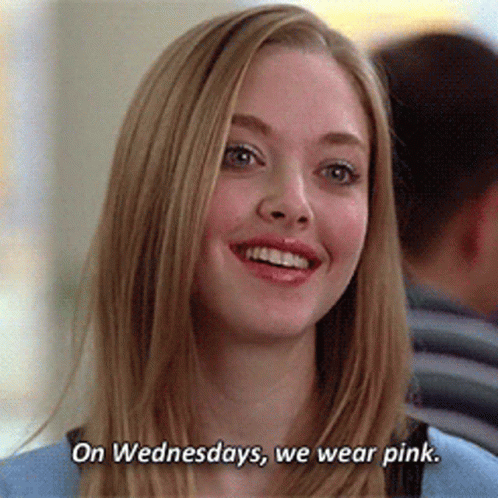
Hygiene put ons:
- Glossier Body Hero Wash
- Glossier Body Hero Exfoliating Bar
- Glossier Body Hero Cream
- Glossier Body Hero Oil Mist
- Glossier you Parfum
- Dove Sensitive skin body wash
- Tumeric Bar Soap
- Eos Vanilla shave cream
- Method body wash
- Dr. Brenners Bodywash
- Any Vanilla/ Strawberry/ Coconut oil
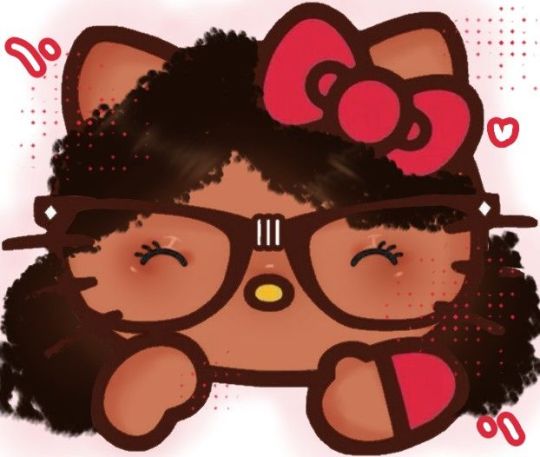
Skincare needs for the girlys:
SkinTherapy Oil
Farsali rose gold elixir
Cerave Gel/Foam Face wash
Thayers Unscented Witch hazel Toner
Vasaline (on lips, under eyes, lashes, brows)

A FEEL OF ME PLAYLIST
Faerie sorrie - Melanie Martinez
So High - Doja cat
Wine Pon Po - Doja cat
From Persephone - Kiki Rockwell
POV - Ariana Grande
Skinny Dipping - Sabrina Carpenter
Skin - Sabrina Carpenter
Gross - Olivia Rodrigo
I Promise Im Trying - Cavetown
Issues - Julia Michaels
Dusse - Mere/ Meredith Reves
No Wind Resistance - Kinneret
How High - Ice Spice
Beginning Middle End - Leah Noble
Butterfly Ku - Ice Spice
Paint The Town Red - Doja Cat
Attention - Doja Cat
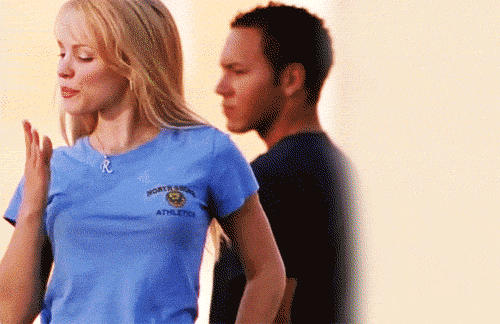
#black girl magic#black women#pretty#pretty black woman#pbc#chubby#makeup#pink nails#about me#nastygal#gif#gift#anime gif#flashing gif#gif warning#multi#mean girls#hairspray#movies#never been kissed#letterboxd#aesthetic#aestethic#aestheitcs#aestehtic#colours#inspo#pretty stuff#items#toocute
19 notes
·
View notes
Note
essa mona da foto com o esteban (foaming on the mouth inclusive) é a soldada MAIS FORTE que já existiu na terra. é a atriz que faz a peça com ele E fernando… como que não desmaia de tesao só de estar perto desses dois (e abraçando o kuku sem camisa… gatilhos fortíssimos)
deus realmente tem seus favoritos e a mana é A soldada né pqp. mas real queria ter a oportunidade de assistir essa peça, não só por eles mas tb pq parece muito interessante
5 notes
·
View notes
Text
discipline, like joy,
is a matter of focus
but also conditions.
i lift my eyes out of the great,
looming dark, work my hands
into the foaming water,
return my senses to a shared
& honest body.
its signs & signals
give themselves over to me
in every degree, daily & readily.
the presence of the Lord
nearer to me than my own form.
in Communion / of the Body,
we witness & bear
our semi-reliable memory,
our more reliable song,
& the constant process
of being changed by each other.
talking it out.
loving & moving it through.
Morning Routine by Terra Oliveira, published in The Rising Phoenix Review
2 notes
·
View notes
Note
wedding planner/nurse au (if it’s nurse eddie i Will start foaming at the mouth btw, and even if it’s not i’ll still be endlessly excited for it!!!)
Look. it IS nurse!Eddie and it IS the unholy hybrid of clipboard!Buck and Buck 1.0 and it has been wildly derailed by the prompts I’m working on but considering the way it dropped uninspired by anything and unprompted into my head I am not concerned its gonna go anywhere until ive finished it. Have the opening!
The Banks-Jackson wedding is cursed.
Buck knows it from the first moment his boss suggests that if it goes well, maybe she will take that early retirement she’s been talking about and leave the company in Buck’s care instead. He just becomes more convinced when the caterer backs out at the last second and they have to replace them with a company Buck’s never heard of that the bride’s mother suggests – and then strong-arms Buck into hiring with the excuse that she’s the one paying for the wedding and therefore also paying Buck. And then, when they’re actually at the venue on the day of, he just gets proven right.
“Everything looks good, kid, I trained you well,” Tammy tells him while she and Buck stand at the top of the terra cotta stairs that connect the event hall to the garden to the street. Buck is still checking things off on his clipboard while the bartender and his minions carry cases past them so he isn’t paying her much attention.
“Thanks,” he remembers to say belatedly.
“Just, try not to sleep with any bridesmaids at this one,” Tammy adds.
“Not at this one,” Buck promises. “I planned this one. I’ll be busy.”
Hot bridesmaids have been a perk of the job when he was a wedding planner’s assistant. But this wedding, he’s the actual wedding planner, so he just won’t have time to hook up with any of them in the bathroom. Also, he’s pretty sure every single bridesmaid is related to either Banks or Jackson and both families seem a little…stabby.
“Good boy,” Tammy says, clapping him on the shoulder.
Buck nods, trying not to take the compliment too seriously since Tammy rarely means them the way other people mean them, and looks back at his clipboard.
He’s checking off a few other cases of things for the bar when he hears a shriek and then a thump.
Somehow, one of the venue staff had knocked into Tammy with a stack of chairs and sent her spinning down the terra cotta steps.
Ask me about my wips!
66 notes
·
View notes